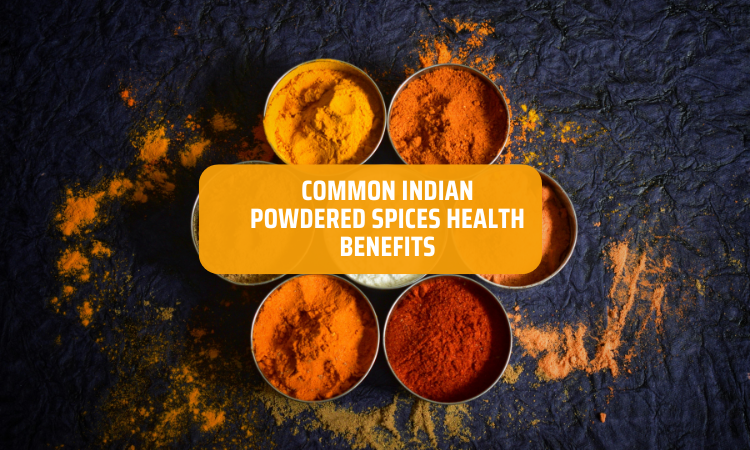
Common Indian Powdered Spices Health Benefits
Share
Indian kitchens are the territory of colourful powdered spices. Just think about them, these top essential spices are like magic. They make our food tasty and aromatic but that’s not all. They also boost your health.
Didn’t know it? No problem!
In this blog, we will discuss some of the most common Indian spices that you can find in everyone’s home and how they help keep us healthy.
Why Are Indian Spices Special?
- Indian spices have been used for thousands of years for both cooking and healing.
- They are full of antioxidants, vitamins, and minerals.
- Many help fight germs, reduce swelling, and keep our hearts and brains healthy.
Top Indian Powdered Spices & Their Benefits:

Here’s a table to make it easy to understand:
|
Spice |
Key Health Benefits |
Fun Fact |
|
Turmeric (Haldi) |
Fights swelling, boosts brain health, heals wounds, protects the heart |
Used in almost every Indian curry.
|
|
Cumin (Jeera) |
Helps digestion, rich in iron, fights germs, may help with weight loss |
Makes food smell and taste earthy.
|
|
Coriander (Dhania) |
Improves digestion, lowers blood sugar, fights infections |
Used in curries and chutneys.
|
|
Ginger (Adrak) |
Soothes tummy, reduces nausea, helps with coughs and colds |
Used in tea and curries.
|
|
Cardamom (Elaichi) |
Freshens breath, helps digestion, may lower blood pressure |
Used in sweets and tea.
|
|
Cinnamon (Dalchini) |
Lowers blood sugar, fights infections, good for heart health |
Used in desserts and biryanis.
|
|
Red Chili Powder (Lal Mirch) |
Boosts digestion, helps burn calories, fights cholesterol |
Makes food spicy and red.
|
|
Clove (Laung) |
Good for teeth, fights pain, helps with coughs |
Used in Garam masala.
|
|
Fenugreek (Methi) |
Lowers blood sugar, helps digestion, good for heart |
Used in pickles and curries.
|
|
Black Pepper (Kali Mirch) |
Boosts metabolism, helps absorb nutrients, fights infections |
Called “King of Spices |
What You Need to Know About the Most Common Spices?
1. Turmeric (Haldi)
- Contains curcumin, a powerful antioxidant.
- Helps heal wounds and fight infections.
- Good for your brain and may help prevent memory loss.
2. Cumin (Jeera)
- Makes food easier to digest.
- Full of iron that helps make red blood cells.
- May help with weight loss and fighting germs.
3. Ginger (Adrak)
- Soothes upset stomach and helps with nausea.
- Fights inflammation (swelling) and pain.
- Used for coughs, colds, and even muscle pain.
4. Cardamom (Elaichi)
- Freshens breathe naturally.
- Helps with digestion and reduces gas.
- May help lower blood pressure and keep your heart healthy.
5. Cinnamon (Dalchini)
- Lowers blood sugar and cholesterol.
- Fights germs and supports the immune system.
- Good for heart health and may help prevent diabetes.
Quick Facts about Indian Spices:
- Most Indian spices are safe to use but you shouldn’t use them in large quantities. Highly spicy food can cause problems.
- Spices like turmeric and ginger are used in traditional medicines for healing cuts and colds.
- Black pepper helps your body absorb curcumin from turmeric. This makes them both more effective than separate.
-
Red chilli powder can help burn calories and may with pain relief as well. But eat it in moderation only.
How to Use These Spices?
- Add turmeric and cumin to curries, dals, and soups.
- Sprinkle black pepper on salads and eggs.
- Mix ginger powder into tea or warm water with honey.
- Use cinnamon in porridge, desserts, and fruit salads.
- Add cardamom to milk, tea, or rice puddings.
Conclusion:
Indian top essential spices don’t only make food tastier, they keep your health in check as well. They have so many health properties that make your body stronger and more immune to illness.
In this blog, we have discussed the most common Indian spices and their health benefits. Hope you’ve learned something new today. So next time you see these colourful spices, see them as your health warriors.
